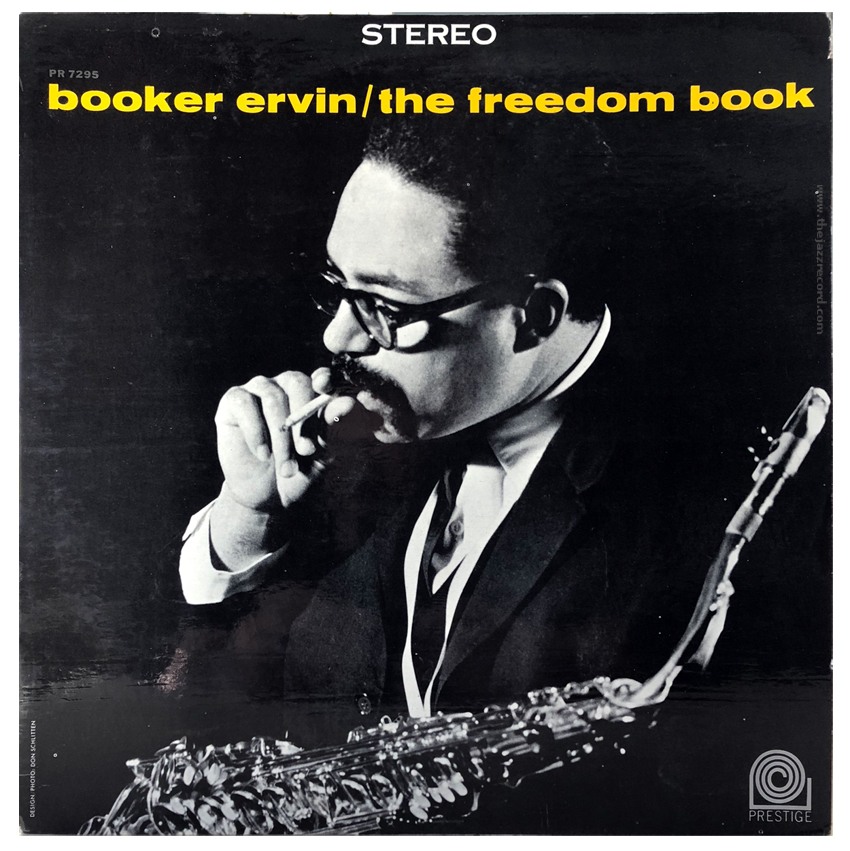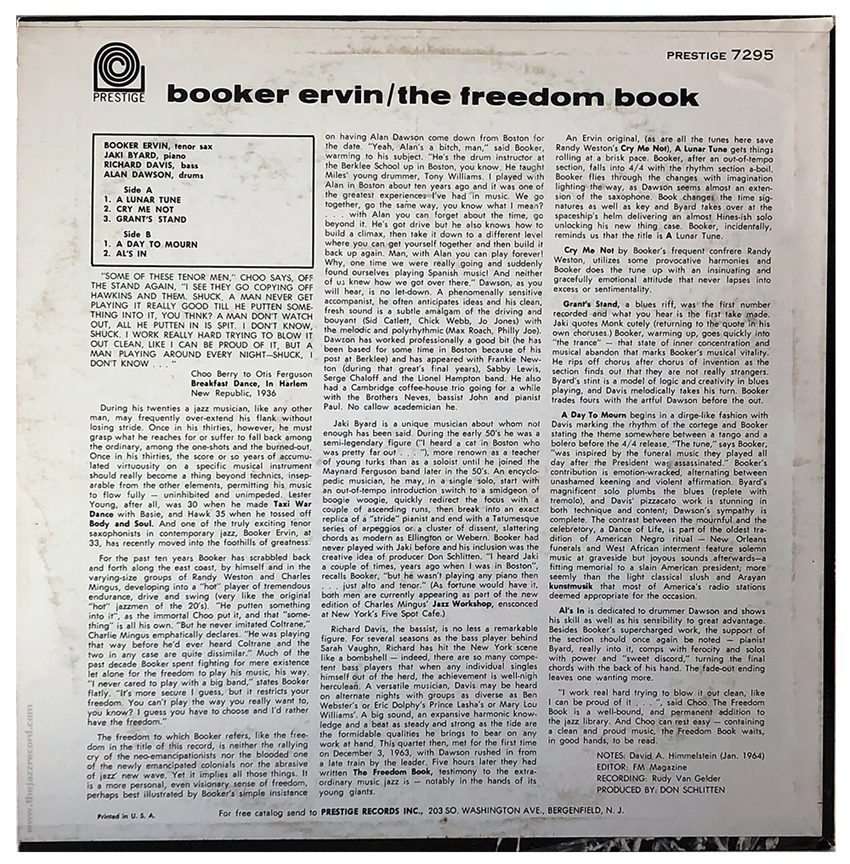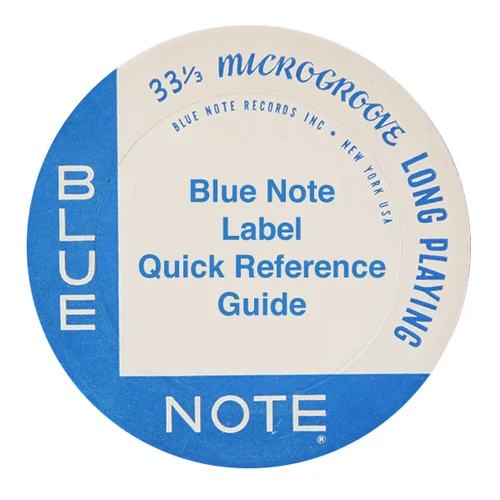Leading His Own Way: Booker Ervin - "The Freedom Book"
/

Booker Ervin • The Freedom Book • 1964 • Prestige Records
Recorded December 3, 1963 at Van Gelder Studios
The Tracks:
A1. A Lunar Tune
A2. Cry Me Not
A3. Grant’s Stand
B1. A Day To Mourn
B2. Al’s In
The Players:
Booker Ervin - Tenor Sax
Jaki Byard - Piano
Richard Davis - Bass
Al Dawson - Drums
The Selection:
The Vinyl:
When I originally picked up this beautiful second pressing of “The Freedom Book” I almost immediately set it back down in the rack, simply because these “blue trident” Prestige labels always seem like such a let down from the possibility that you could have found an ever-so-classic yellow and black “fireworks” label pressing. And, of course, there is that stupid modern day stigma of it not being a first pressing, even though I always try not to let that color my decision making when I come across a classic vintage jazz title to add to the collection.
A quick check on the smartphone showed that “The Freedom Book” dated from 1964, meaning it was entirely possible that the “blue trident” label could indicate a first pressing, and while that is not the case here, it turns out that 1964 was the year that Prestige switched label designs (couldn’t they have come up with something a little more creative looking?!?) and this album appears to have had a short run on the yellow “fireworks” label and was then quickly re-pressed on the label version seen here.
It turns out that while neither the first or second pressings from 1964 are easy to come by, they are also not all that sought after either: the original “fireworks” pressing recently fetched $200 on eBay, while the second blue label version could be had in VG+ for under $100. No one seems interested in the original black and silver “stereo fireworks” pressing, and if you aren’t a label snob it was repressed on the lime green label in the early-1970s (which have always sounded just fine on my turntable and are always a great way to grab a classic Prestige title at a bargain price). I scored my VG+ copy for $40 (after bargaining down from the original sticker price of $80), so I’m more than pleased with my purchase from a marketplace point of view. As far as the blue trident label, loyal readers know I’m far from a first-pressing snob, but these generic looking labels always get me down - I guess I’ll just have to come to terms with my design bias and learn to turn the other cheek and just enjoy the music!
The Music:
These days Booker Ervin is usually remembered for his association with Charles Mingus, a fruitful period that resulted in some amazing albums, most notably the all-time classic Mingus Ah Um (but also the great Mingus, Mingus, Mingus, Mingus, Mingus which I wrote about here). Ervin, however, also had a great run of solo records on Prestige from 1963 through 1966, the best of which are his “Book” series which began with the release of The Freedom Book in 1964 (and continued with The Song Book, The Blues Book and The Space Book).
In the liner notes, Ervin gives some insight into the title:
“I never cared to play with a big band,” states Booker flatly, “It’s more secure I guess, but it restricts your freedom. You can’t play the way you really want to, you know? I guess you have to choose and I’d rather have the freedom.”
And freedom suits Ervin perfectly. He has a muscular and hard-edged tone that is distinctly his, and he puts it to great use on this record. The quartet assembled here isn’t a working group - Ervin put the group together specifically to record the album - but their rapport is excellent. He had played with Jaki Byard during his time with Mingus (Byard is one of the true underrated talents of jazz), but he hadn’t played with drummer Alan Dawson in nearly a decade and Richard Davis on bass was a relative newcomer to the jazz scene at this point. The four musicians got together for the first time on the very same day that they recorded The Freedom Book, a risky undertaking to be sure, but as the resulting music shows, these cats meshed perfectly. It’s a testament to not only their talents, but also to the skills of Ervin as a leader.
The music the group lays down is definitely not “chilling-out-on-a-sunday-morning” jazz, but rather a set of challenging tunes that demands the listener’s attention. Ervin is definitely doing his own thing here, not concerned with which way the winds of popular jazz were blowing in the early 1960s, perhaps a trait he learned from his time playing with Mingus, a jazz cat at the top of the heap when it comes to following one’s own musical vision. The Freedom Book takes a hard bop base, adds a little post bop to the mix, and finishes things off with just a touch of the avant garde to create a record that has more than stood the test of time, and is certainly an album worthy of many repeated enjoyable spins on the turntable.
The Videos:
A couple of super cool video clips for your viewing pleasure, the first one here features the Charles Mingus Sextet performing “I’ll Remember April” at the Antibes jazz festival in 1960, with an all-star group featuring Bud Powell on piano, Booker Ervin on tenor, Eric Dolphy on alto, Ted Curson on trumpet and Dannie Richmond on drums. A truly historical clip with some of the best jazz players of their day.
The second video is an undated clip featuring Ervin and Curson joined by Pony Poindexter on alto, Nathan Davis on flute, Kenny Drew on piano and Edgar Bateman on drums running through a smoking hot take of Miles Davis’ “Milestones” in what appears to be a small jazz club judging on how tightly the players are packed on the stage. It sure doesn’t seem to bother the musicians any, though, as they show off their chops on this modal classic.












